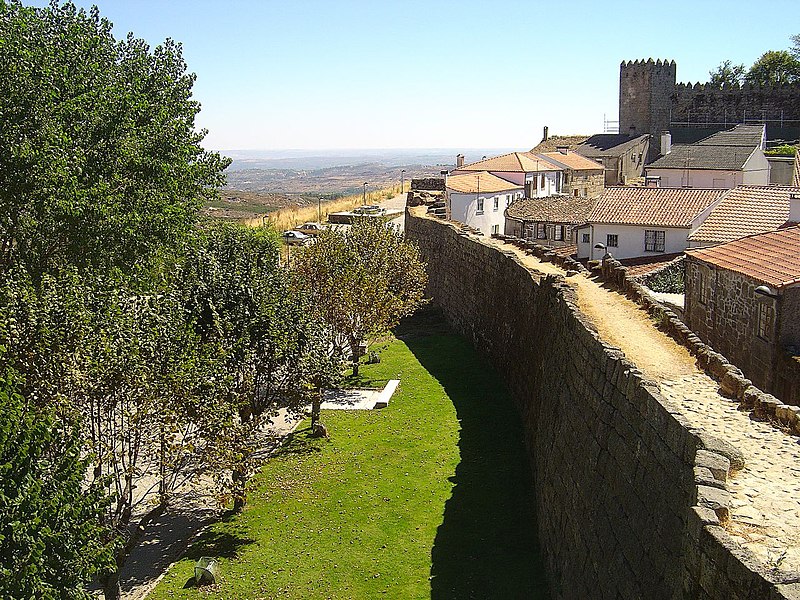The town of Trancoso is an ancient city at the crossroads of many wars, and as such was transformed into a fortress. The Jewish presence probably dates back to the 12th century. Its population soon increased as a result of the Spanish Inquisition, mainly due to the arrival of Jews from Aragon and Castile. As a result, the community asked King John II for the right to expand the synagogue.

The medieval town of Trancoso is very strongly marked by its Jewish past. Indeed, throughout the Middle Ages, the community of this city in northern Portugal has experienced an economic and social expansion almost unique in Europe. Trancoso, thanks to its important fair, was a city of passage and exchange.
In the fifteenth century, the Jewish population rose to more than 500 people, which forced the community to settle outside the boundaries of the judaria. Even today, there are many traces of this past in the streets of Trancoso. Following the establishment of the Inquisition in Portugal, many of Trancoso’s Jews fell victim to persecution.
As you walk through the city, you will find Hebrew inscriptions, stars of David, and other symbols on the door jambs. Leave the El Rei Gate and go to Corredoura Street and São João Street. In Estrela street you will also find inscriptions. In Banderra Street, a candlestick carved in stone. In Largo Luís de Albuquerque, admire the most famous Jewish house in the city: Casa de Gato Preto (the house of the black cat). A lion of Judah and the walls of Jerusalem are carved around the door. It is likely that this house belonged to the rabbi of the community, or even that the building housed the synagogue. Continue your way to Algria and Mercadores streets, and finally to Cavaleiros street where there is an engraved Star of David. On Dinis Square, where in the 1980s a roll containing Shema Israel was found in a house in a wall.
Finish your visit with the Jewish Cultural Center Isaac Cardoso. Founded in 2012, this space, designed by the architect Gonçalo Byrne, hosts, in addition to the center, the Beit Mayim synagogue, a garden, two temporary exhibition halls, a conference room, and a courtyard where found a well and Hebrew inscriptions. In the Center, you will have access to archives on the history of the 700 Jews of Trancoso persecuted during the Inquisition. The center also catalogs all the inscriptions found in the city, to date 300 in number.
A great scholar of Trancoso: Isaac Cardoso
Isaac (Fernando) Cardoso was a physicist, philosopher, and Jewish writer. He was born of marrano parents in 1603 or 1604 in Trancoso, and died in Verona in 1683. He was the brother of Abraham (Miguel) Cardoso.
After studying my medicine, philosophy, and natural sciences in Salamanca, he moved to Valladolid in 1632, then to Madrid. Among the works he published in Spain, there is a treatise on Vesuvius, the color green or cold water.
Born Fernando, he leaves Spain, probably to escape the Inquisition, and exiles with his brother Miguel in Venice. The two brothers re-adopt Judaism and change their names for Isaac and Abraham. He died in Verona, recognized and esteemed by Jewish and Christian communities.
Cardoso published in Venice in 1673 the treatise Philosophia Libera in Septem Libros Distributa, in which he affirmed himself as a declared enemy of the Kabbalah and the false prophet Sabbatai Zevi – his brother was a partisan.
Finally, the most important work of this “God-fearing scholar”, as described by Moses Hagiz, is Las Excelencias y Calunias de la Hebreos, printed in 1679 in Amsterdam. In this book, he defends the “excellence” of his associates: their selection by God, their separation from other peoples through special laws, their compassion, philanthropy … He then refutes the “slanders” that are made to them: ritual killings, false idols, blasphemy of sacred images … This treaty made a great noise for its publication, and was celebrated by the greatest rabbis and scholars of Europe.
Sources : Encyclopaedia Judaica, Rede de Judiarias